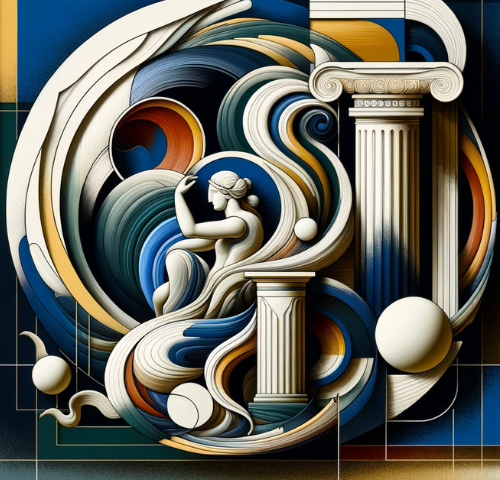
Top 7 Athens Street Food Restaurants in Athens for 2024, beyond Souvlaki
March 6, 2024
Marina Satti’s Eurovision 2024 song is released
March 8, 2024Homeric propositions are the meanings and concepts of Homeric thought and reflection, which became the property and foundation of the Greek language.
Homeric language goes hand in hand and coexists with Homeric thought. There is an ambiguous correspondence between Homeric language and Homeric thought. Otherwise, these texts would not have lasted for some 2900 years, and indeed at the pinnacle of world literature. The Homeric language can and does allow Homer’s creative thought to be expressed with quality, simplicity, moderation and precision.
Let us recall what Homer tells us through the mouth of Hector in M, 243 of the Iliad: Eis oonos aristos, amynesthei per patris. Six words lead to the formulation of a unique phrase in Homeric language, which brings us to a climactic meditation and then to the Homeric world.
Aristotle states: “Hellenisation is the beginning of the word. The Greek language is the beginning and the root of communication.
What made Cicero say: “The gods are spoken, the Greek language is spoken”. The answer is simple: when the gods speak, they use the Homeric language. It is precise and therefore divine.
Homeric words are fresh, cool, fragrant, wonderful, always hiding something, always reminding us of something. But Homeric words do not exist for the words themselves and their beauty. Homeric words exist to explain and illuminate, to highlight meanings and concepts. To remind us of the meaning of hospitality, the meaning of sacrifice, the value of bravery, of sport, the value of reason, the value of debate and assembly, of the agora, of promise, of duty. All this is expressed in words, in a language that has brought the Homeric texts to the fore.
Homer was endowed with a unique talent for understanding the world: The universal world. The whole world. The visible and the invisible world. The Olympian world of the gods, with their virtues and weaknesses. The world of mortal men with their virtues and faults, their wisdom, their thoughts and ideas, the world of plants and animals. The heavenly world, the humid world. The underworld of the dead. All these worlds are perceived by Homer, understood, thought about and expressed in Homeric language.
In studying the Homeric epics, we move from the Homeric universe, the world of the Whole, to contemplation and ideas. And this is thanks to the Homeric language, which is the chariot that takes us to cognition and the total perception of the world.
The ambiguous relationship that makes up a software is the following:
Homeric words<-> Homeric language<-> Homeric concepts and reflections<-> Homeric world. The symbol <-> means: follows and vice versa. The software of Homeric contemplative thought and cognition has an absolute correspondence with the software of Homeric language and vice versa. The philosopher Wittgenstein said it with absolute clarity: ‘My world is my language’ or ‘The limits of my world are the limits of my language’. Without language it is impossible to describe the whole world that I have in my mind, that I have understood, that I have thought and reflected upon.
Good use and understanding of Homeric language does not come from learning words, but from the ability to understand Homeric thought, concepts and reflection as best we can. Homeric language has a primary, archetypal, high quality. It is a gold mine. It is an easily exploitable layer of gold and jewels within the DNA of universal thought.
This unsurpassed quality is at once a quality in Homeric thought and in our own contemplative approach to the Homeric epics. So we experience both the Homeric world and the contemporary world with quality.
Homer says of Achilles in the Iliad, Rhapsody I, verse 413:
Alleto me moi νόστος, atar kleos aftiton estha.
There is no return for me, but the glory shall be everlasting.
-The Homeric language documented and emphasised mythology.
-The Homeric language prepared the ground for poetry after Homer. It prepared the ground for theatre, for philosophy, for political thought and democracy, for scientific research, for sport…
The foundations of the Homeric language are persons and things denoted by nouns, acts and actions denoted and expressed by verbs, characterisations denoted by adjectives, and details and specifications denoted by articles.
Iliad, Rhapsody 1, f. 1-4.
Menin(1) Evergreen, Goddess(2), Peliadeo Achilles
“I have been to the Achaeans.
“And she has brought forth many a faithful soul.
of heroes,
I’m a man of the world.
Sing, goddess, the terrible oracle of Achilles,
who gave the Greeks endless grief
and led untamed souls to Hades.
Heroes…



